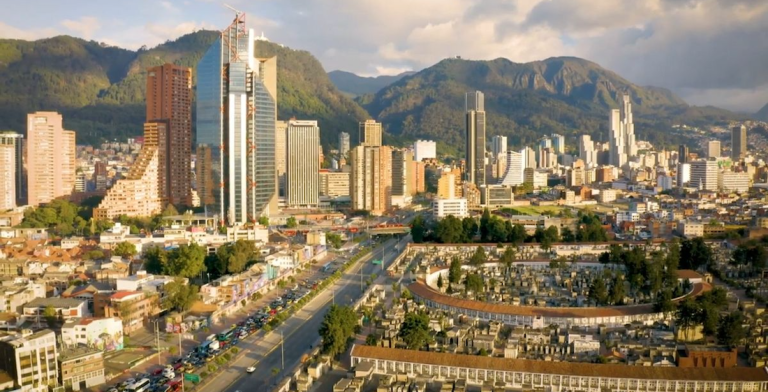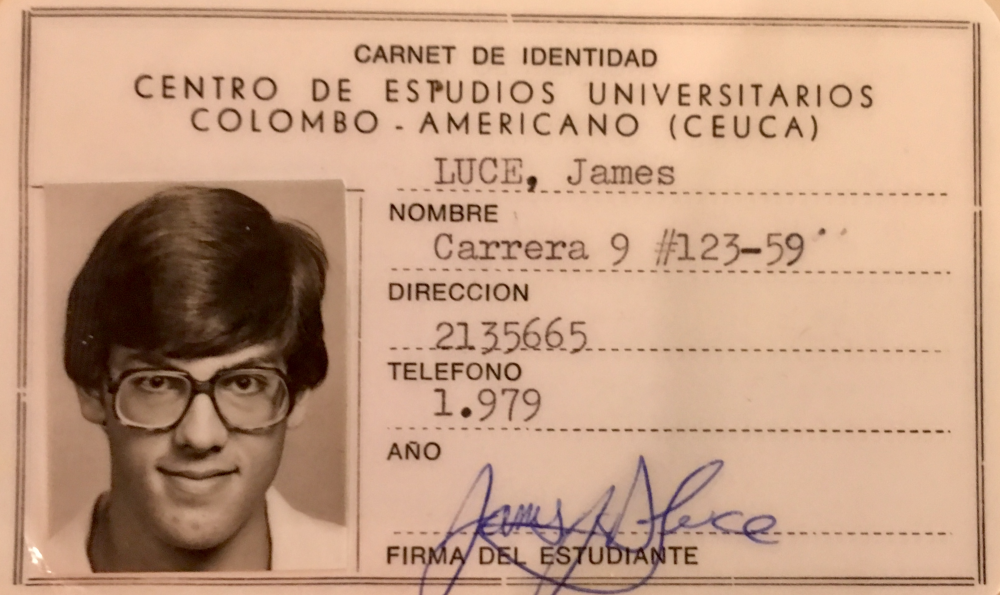
From zero Spanish to reading Marquez: My journey as a pioneering exchange student in Colombia’s vibrant capital
New York, N.Y. – In 1979, I found myself standing in Bogotá‘s El Dorado International Airport, clutching my suitcase and a Spanish-English dictionary that would become my lifeline. As an Asian Studies major from the College of Wooster, I had been selected by the Great Lakes College Association for an experimental exchange: could a student with absolutely no Spanish language background survive and thrive in Colombia? Until then, the program had required two years of Spanish study as a prerequisite. I was the guinea pig who would test whether those language barriers were truly necessary.
The Family Who Shaped My Colombian Experience

My new home was a modest but welcoming apartment at Carrera 9 #123-59, near the then-new shopping center Uni Centro, where I was embraced by a Colombian family and their maid who spoke not a word of English. Those first days were a blur of wild gesticulations, confused facial expressions, and thumbing desperately through my dictionary.
My host mother, a patient woman with kind eyes, would hold up household items, pronounce their Spanish names clearly, and wait expectantly for me to repeat them. Dinner conversations were exercises in creative communication—pointing, drawing, and occasionally acting out concepts when words failed.
Centro de Estudios: The Academic Challenge
My studies at Centro de estudios universitarios colombo-americano, affiliated with Universidad de Los Andes, presented a different kind of immersion challenge. On my first day, I sat through lectures understanding perhaps five percent of what was being said. I furiously wrote down unfamiliar words to look up later and relied heavily on context clues and the occasional bilingual classmate for clarification. Professors, aware of my unique situation, often provided additional materials or explanations after class.
The language barrier turned every interaction into a puzzle to solve. Ordering food, taking buses, asking directions—each daily task became both a challenge and a triumph. I carried a small notebook everywhere, jotting down new words and phrases I encountered. At night, I would review these entries by lamplight, determined to build my vocabulary word by word.
Cultural Immersion Beyond The Classroom

Weekends offered respite from academic pressures but deepened my cultural immersion.
I explored Bogotá’s historic La Candelaria district, where colonial architecture and vibrant street art told stories of Colombia’s complex history.
At local markets, I practiced my growing Spanish vocabulary while haggling for emerald trinkets and hand-woven mochila bags.
Sunday afternoons often found me in Simón Bolívar Park, watching families gather for picnics and music.
The rich cultural tapestry of Colombia extended beyond Bogotá. During holiday breaks, fellow students invited me to their family homes in Medellin, Cartagena, and the coffee-growing regions.
These excursions revealed a country of stunning diversity—from Caribbean coastal traditions to Andean mountain cultures.
Each region presented new dialects and expressions, further challenging and expanding my language abilities.
The Marquez Milestone

Three months into my stay, a pivotal moment occurred in my literature class.
The professor assigned Gabriel García Márquez‘s Cien Años de Soledad (One Hundred Years of Solitude).
While other exchange students groaned at the assignment’s difficulty, I approached it with determination.
Night after night, I sat at my small desk, dictionary at hand, unraveling Marquez’s magical realism sentence by sentence.
The first chapters took hours to decipher, but gradually, something remarkable happened.
The need to translate diminished as I began thinking in Spanish, dreaming in Spanish,
living in Spanish. By the semester’s end, I could discuss the novel’s themes and nuances
alongside my Colombian classmates—a feat that seemed impossible just months earlier.
The Legacy of Linguistic Immersion
When I returned to the U.S., the Great Lakes College Association evaluated my experience as a successful experiment.

The language prerequisite policy was subsequently modified, opening doors for more students to experience Colombian culture regardless of their prior Spanish study.
My journey had proven that with determination and immersion, language barriers could indeed be overcome.
Today, decades later, I remain somewhat fluent in Spanish, and the connections I made in Colombia have enriched my life immeasurably.
I may even go back this year to visit an indigenous community from the Amazon.
That semester as a linguistic guinea pig transformed not just my academic path but my understanding of human communication itself.
Language, I discovered, extends beyond vocabulary and grammar—it’s about connection, perseverance, and the willingness to make countless mistakes in pursuit of understanding.
My experience in Bogotá taught me that we are capable of far more than we imagine when pushed beyond our comfort zones. Sometimes, the most profound learning happens precisely when we feel most lost.
#ColombiaExchange #LanguageLearning #StudyAbroad #CulturalImmersion #Bogota #SpanishLearning
TAGS: Colombia, study abroad, language immersion, Bogota, exchange student, Spanish learning,
1979, Great Lakes College Association, College of Wooster, Gabriel Garcia Marquez
75-Word Summary for Audio File
In 1979, as an Asian Studies major with zero Spanish knowledge, I became the experimental exchange student for the Great Lakes College Association’s program in Bogota, Colombia. Living with a non-English speaking family and studying at Centro de estudios universitarios colombo-americano, I navigated daily challenges through determination and immersion. Against all expectations, by semester’s end, I was reading Gabriel García Márquez alongside native speakers, proving language prerequisites weren’t necessary for meaningful cultural exchange.
Social Media Blurbs
For X: Breaking Language Barriers In Bogota: From zero Spanish to reading Marquez in one semester. My 1979 immersion journey proved language prerequisites unnecessary. #StudyAbroad #LanguageImmersion bit.ly/BogotaStory
Bluesky: Breaking Language Barriers In Bogota: My journey from complete Spanish novice to reading Gabriel García Márquez alongside native Colombian students in just one semester. The power of immersion! #LanguageLearning #CulturalExchange bit.ly/BogotaStory
LinkedIn: Breaking Language Barriers In Bogota | In 1979, I participated in a groundbreaking experiment by the Great Lakes College Association: could a student with zero Spanish language background succeed in Colombia? My experience transformed educational policy by proving immersion’s effectiveness, ultimately changing program requirements and opening doors for future students. This story highlights how challenging traditional prerequisites can lead to innovative educational approaches. #HigherEducation #InternationalEducation https://www.stewardshipreport.org/breaking-language-barriers-in-bogota
Truth Social: Breaking Language Barriers In Bogota: How I went from zero Spanish to reading Gabriel García Márquez in just one semester as an exchange student in Colombia. My 1979 journey proved immersion works! #StudyAbroad #LanguageLearning https://www.stewardshipreport.org/breaking-language-barriers-in-bogota
Mastodon: Breaking Language Barriers In Bogota: In 1979, I was sent to Colombia as an experimental exchange student with zero Spanish knowledge. Against all expectations, total immersion led me from confused dictionary-flipping to reading complex literature in just one semester. Anyone else have similar language immersion experiences to share? #LanguageLearning #CulturalExchange https://www.stewardshipreport.org/breaking-language-barriers-in-bogota
Instagram: Breaking Language Barriers In Bogota: My journey from language novice to fluency through total immersion in 1979 Colombia. Tap the link in bio to read how I went from zero Spanish to reading Marquez in one semester!
#StudyAbroad #LanguageLearning #CulturalImmersion #ColombiaTravel #SpanishLanguage
Facebook: Breaking Language Barriers In Bogota: In 1979, I became the Great Lakes College Association’s “guinea pig” – the first student with zero Spanish to study in Colombia. Living with a non-English speaking family and struggling through university classes, I somehow went from complete novice to reading Gabriel García Márquez in just one semester! #LanguageImmersion #StudyAbroad https://www.stewardshipreport.org/breaking-language-barriers-in-bogota
Reddit: Breaking Language Barriers In Bogota: How I went from zero Spanish to reading Gabriel García Márquez during a 1979 exchange program in Colombia. Have any of you experienced a similar linguistic deep-end situation? How quickly were you able to become functional in a completely unfamiliar language? #LanguageLearning #StudyAbroad https://www.stewardshipreport.org/breaking-language-barriers-in-bogota.